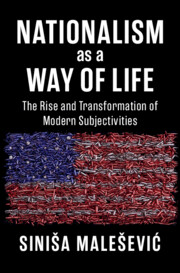Refine search
Actions for selected content:
552 results
1 - Techno-missionaries
- from Part I - Growth
-
- Book:
- Charity After Empire
- Published online:
- 18 December 2025
- Print publication:
- 28 February 2026, pp 29-60
-
- Chapter
- Export citation
Chapter 3 - The Colonial Heartland
-
- Book:
- Wales, Romanticism, and the Making of Imperial Culture
- Published online:
- 12 December 2025
- Print publication:
- 22 January 2026, pp 97-136
-
- Chapter
- Export citation
Chapter 4 - The Other Within
-
- Book:
- Wales, Romanticism, and the Making of Imperial Culture
- Published online:
- 12 December 2025
- Print publication:
- 22 January 2026, pp 137-176
-
- Chapter
- Export citation
Chapter 5 - “A Perfect Potosi”
-
- Book:
- Wales, Romanticism, and the Making of Imperial Culture
- Published online:
- 12 December 2025
- Print publication:
- 22 January 2026, pp 177-223
-
- Chapter
- Export citation
Chapter 2 - Ancient Britons and Ancient Britains
-
- Book:
- Wales, Romanticism, and the Making of Imperial Culture
- Published online:
- 12 December 2025
- Print publication:
- 22 January 2026, pp 58-96
-
- Chapter
- Export citation
Chapter 4 - Queer/Trans of Color and Indigenous Critique
-
- Book:
- The Cambridge Introduction to Queer and Trans Studies
- Published online:
- 24 November 2025
- Print publication:
- 18 December 2025, pp 136-170
-
- Chapter
- Export citation
Chapter 5 - Global Dynamics, Refusals, and Reorientations
-
- Book:
- The Cambridge Introduction to Queer and Trans Studies
- Published online:
- 24 November 2025
- Print publication:
- 18 December 2025, pp 171-206
-
- Chapter
- Export citation
HERODOTUS ON THE EXPEDITION OF DATIS AND ARTAPHRENES: ATHENIAN IMPERIALISM MIRRORED IN THE FIRST PERSIAN WAR
-
- Journal:
- The Classical Quarterly , First View
- Published online by Cambridge University Press:
- 17 December 2025, pp. 1-14
-
- Article
-
- You have access
- Open access
- HTML
- Export citation

Nationalism as a Way of Life
- The Rise and Transformation of Modern Subjectivities
-
- Published online:
- 11 December 2025
- Print publication:
- 11 December 2025
3 - From Religious to Nationalist Subjectivities
-
- Book:
- Nationalism as a Way of Life
- Published online:
- 11 December 2025
- Print publication:
- 11 December 2025, pp 83-116
-
- Chapter
- Export citation
5 - The Golden Age and Nationalist Narratives
-
- Book:
- Nationalism as a Way of Life
- Published online:
- 11 December 2025
- Print publication:
- 11 December 2025, pp 152-181
-
- Chapter
- Export citation
Neo-Colonialism, Underdevelopment, and the Making of a Radical Pan-African and Leftist Economic Institute, 1970–80
-
- Journal:
- The Journal of African History / Volume 66 / 2025
- Published online by Cambridge University Press:
- 11 December 2025, e28
-
- Article
-
- You have access
- Open access
- HTML
- Export citation
2 - Between the Imperial and the National Worlds
-
- Book:
- Nationalism as a Way of Life
- Published online:
- 11 December 2025
- Print publication:
- 11 December 2025, pp 47-82
-
- Chapter
- Export citation
4 - National Movements and Imperial Discontent
-
- Book:
- Nationalism as a Way of Life
- Published online:
- 11 December 2025
- Print publication:
- 11 December 2025, pp 117-151
-
- Chapter
- Export citation
8 - Children’s Poetry from 1840 to 1950
-
-
- Book:
- The Cambridge History of Australian Poetry
- Published online:
- 19 November 2025
- Print publication:
- 11 December 2025, pp 150-168
-
- Chapter
- Export citation
12 - The Imperial Romance
- from Part II - Entanglements of Prose, Poetry, and Empire: 1800–1900
-
-
- Book:
- The Cambridge Companion to British Literature and Empire
- Published online:
- 20 November 2025
- Print publication:
- 04 December 2025, pp 174-186
-
- Chapter
- Export citation
18 - British Fiction, Decolonization, and the Cold War
- from Part IV - Pathways and Legacies: 1945–2020
-
-
- Book:
- The Cambridge Companion to British Literature and Empire
- Published online:
- 20 November 2025
- Print publication:
- 04 December 2025, pp 259-278
-
- Chapter
- Export citation
5 - Anglophone Epics and Ruin Poetry in Eighteenth-Century India
- from Part I - Early Intimations and Literary Genres: 1500–1800
-
-
- Book:
- The Cambridge Companion to British Literature and Empire
- Published online:
- 20 November 2025
- Print publication:
- 04 December 2025, pp 77-92
-
- Chapter
- Export citation
4 - The Russo-Japanese War, 1904–1905
- from Part II - The Imperial Era
-
-
- Book:
- East Asia and the Modern International Order
- Published online:
- 25 November 2025
- Print publication:
- 20 November 2025, pp 76-89
-
- Chapter
- Export citation
8 - The Second Sino-Japanese War and Its Aftermath, 1931–1965
- from Part III - To the Pacific War
-
-
- Book:
- East Asia and the Modern International Order
- Published online:
- 25 November 2025
- Print publication:
- 20 November 2025, pp 148-165
-
- Chapter
- Export citation
